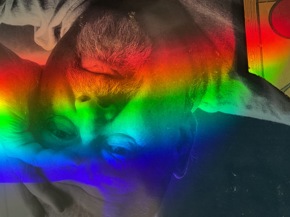34957Y3 HowMuchIsIt?Tussen EinAvdat& haSela haAdom
HUNTER-GATHERERS
HAD NO MONEY. EACH BAND HUNTED,
GATHERED AND MANUFACTURED ALMOST EVERYTHING IT REQUIRED,
FROM MEAT TO MEDICINE, FROM SANDALS TO SORCERY. Different band members
may have specialized in different tasks, but they shared their goods and services through
an economy of f(l)avours & obligations? A piece of meat given for free would carry with it
the assumption of reciprocity - say, free medical assistance. The band was economically
independent; only a few rare items that could not be found locally - seashells, pigments,
obsidian & the like - had to be obtained from strangers. This could usually be done
by a simple barter: 'We'll give you pretty seashells,
and you'll give us high-quality flint!'?
Little of this changed with the onset
of the Agricultural Revolution. Most people continued
to live in small, intimate communities. Much like a hunter-
gatherer band, each village was a self-sufficient economic unit,
maintained by mutual favours & obligations plus a little barter
with outsiders. One villager may have been particularly
adept at making shoes, an other at dispensing medical
care, so villagers knew where to turn
when barefoot or sick?! But villages
were small & their economies
limited, so there could
be no full-time
shoemakers &
doctors.
HAD NO MONEY. EACH BAND HUNTED,
GATHERED AND MANUFACTURED ALMOST EVERYTHING IT REQUIRED,
FROM MEAT TO MEDICINE, FROM SANDALS TO SORCERY. Different band members
may have specialized in different tasks, but they shared their goods and services through
an economy of f(l)avours & obligations? A piece of meat given for free would carry with it
the assumption of reciprocity - say, free medical assistance. The band was economically
independent; only a few rare items that could not be found locally - seashells, pigments,
obsidian & the like - had to be obtained from strangers. This could usually be done
by a simple barter: 'We'll give you pretty seashells,
and you'll give us high-quality flint!'?
Little of this changed with the onset
of the Agricultural Revolution. Most people continued
to live in small, intimate communities. Much like a hunter-
gatherer band, each village was a self-sufficient economic unit,
maintained by mutual favours & obligations plus a little barter
with outsiders. One villager may have been particularly
adept at making shoes, an other at dispensing medical
care, so villagers knew where to turn
when barefoot or sick?! But villages
were small & their economies
limited, so there could
be no full-time
shoemakers &
doctors.
26 jun 2019 - bewerkt op 29 jun 2019
- meld ongepast verhaal
Log in om een reactie te plaatsen.
- O 08 apr 2024 47383 ‘Wij moeten nu eenmaal G d meer gehoorzamen
- O 08 apr 2024 47382 Adverteren brainwash communicatie drukwerk
- O 07 apr 2024 4738166‘Ònder de maaltijd nam Yèsj brood, sprak de
- O 06 apr 2024 47380/65 ‘Yèsj zéi hen:“DOE DIE KRUIKEN VOL WATER“
- O 06 apr 2024 47379’Daarop trad hij op de lijkbaar toe en raakte
- O 06 apr 2024 47378‘Toen hij z’n Toespraak geëindigd had zéi hij
- O 06 apr 2024 47377 ”Zózéér immers heeft G d de wereld liefgehad
- O 06 apr 2024 47376Op zekere dag, zegt Lucky Luke, ging hij zijn
- O 05 apr 2024 4737526 Bijbelse Symbolen in Oud & Nieuw Testament
- O 05 apr 2024 47374 Yosef van Harimatea, ‘n rijke man die in ‘t
- O 05 apr 2024 47373 Sterven Begraven Opstand Hemelvaart Verhalen
- O 04 apr 2024 47372 Over het Líjden van Yèsj is weinig bekend
- O 04 apr 2024 47371/61 Ènkele Aristocraten kwamen kíjken om deze
- O 04 apr 2024 47370 Toen Yèsj o/d tòp van Golgota was áán-
- O 04 apr 2024 47369/60 De gevangene moest zelf het PATIBULUM van
